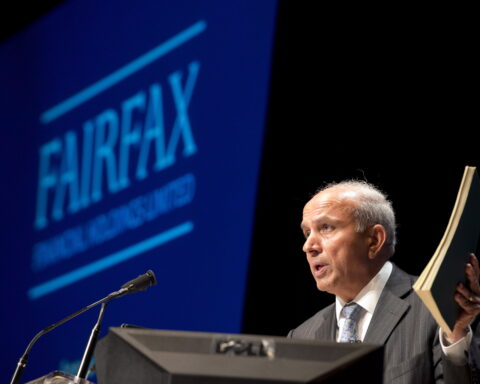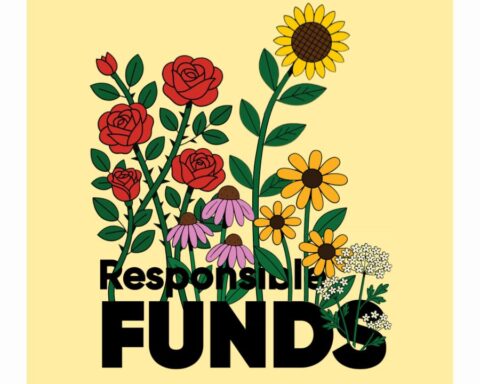Sustainable investing assets in the United States have plunged by more than half to US$8.4 trillion at the end of 2021 from US$17.1 trillion at the end of 2019, according to a new report from the US Forum for Sustainable and Responsible Investment (US SIF).
The U.S. financial industry has reassessed trillions of dollars in sustainable investments, stripping them of their previously reported environmental, social and governance (ESG) status, says the 2022 biennial Report on US Sustainable Investing Trends, released this week and based on a survey of asset managers and institutional investors.
This significant revision has also triggered a huge drop in the share of the total investment market held by sustainable investments in the U.S., plunging to just 13% of US$66.6 trillion last year from 33% on US$51.6 trillion in total assets in 2019.
One of the key drivers behind the change is a decision by several large asset managers to report lower sustainable assets “in the magnitude of billions and trillions of dollars,” compared with the previous report in 2020. The US SIF says this more cautious approach was at least partly triggered by recent US Securities and Exchange Commission (SEC) proposals to crack down on greenwashing by ramping up standards on the names and disclosure requirements for ESG funds.
“The way I see it, we were like the canary in the coal mine,” says Lisa Woll, CEO of the US SIF, in describing the asset revisions after the SEC proposals. “This is a clarion call to those [asset managers] who should have been doing a better job on reporting about their processes.”
In addition to manager caution in reporting sustainable assets, the US SIF also significantly tightened its methodology for the 2022 report, removing a substantial portion of ESG assets included in the 2020 report. Under the new methodology, the US SIF excluded assets of managers who claimed to incorporate ESG policies in their investment decision-making but didn’t identify any specific ESG criteria.
The reports serve as an industry accounting, tallying the size of assets invested under sustainable and responsible guidelines and describing strategies to incorporate ESG criteria and detail investor advocacy on ESG issues in the U.S.
The reports show that assets rose steadily but incrementally between 1995 and 2012 to US$3.7 trillion from US$639 billion.
Sustainable investing assets skyrocket post 2014
But after investment markets recovered from the 2008 financial crash, asset managers enthusiastically embraced sustainable investing to raise client money under the ESG banner. Sustainable assets as reported by the US SIF tripled to $17.1 trillion in 2020 from US$6.6 trillion in 2014.
This followed a worldwide trend. A report from the Global Sustainable Investment Alliance (GSIA) estimated sustainable assets from the U.S., Europe, Canada, Australia and Japan grew to US$35.3 trillion in 2020 from US$22.8 trillion in 2016.
But as assets grew, sustainable finance has attracted a growing chorus of critics accusing the industry of greenwashing.
Last December, Bloomberg published a major investigation into the industry, concluding that ESG ratings are more about corporate risk than social and environmental impact and that ESG data lacks precision and consistency.
More recently, the European investigative journalism group Follow the Money reported that half of so-called dark green investment funds in Europe permit investments in fossil fuel and aviation companies.
Citing greenwashing concerns, regulators have brought greater scrutiny to the ESG industry in the last year. In addition to its proposal to police ESG fund names and disclosure, the SEC is mounting a crackdown on managers claiming to use ESG policies, and it recently announced a fine of US$4 million against fund company giant Goldman Sachs Asset Management, saying it failed to have written ESG policies on some of its ESG funds or had failed to follow them consistently.
Earlier this year, the Canadian Securities Administrators (the umbrella group for Canadian securities commissions) issued guidance for the first time on ESG funds. The rules require managers to align their fund’s name and investment objectives, disclose investment strategies and explain how ESG factors are evaluated and monitored.
And in Europe, regulators established the Sustainable Finance Disclosure Regulation (SFDR), which comes into force on January 1, 2023, requiring funds to categorize themselves as light green, dark green or conventional funds, based on the degree to which investments support sustainability.
The way I see it, we were like the canary in the coal mine.
-Lisa Woll, CEO of the US SIF
These regulatory actions have alarmed the sustainable investment industry.
The latest industry data from Canada shows a similar trend to the U.S., with the official count of ESG assets in a dive. Portfolios classified as responsible investments dropped to $3.0 trillion at the end of 2021 from $3.2 trillion on December 31, 2019, according to figures from the Canadian Responsible Investment Association.
In Europe, asset managers have downgraded at least US$125 billion in funds previously identified as dark green for fear of being offside of the new SFDR requirements.
In response, the GSIA, the global ESG investment network, has announced a collaboration with another powerful ESG investor group, the Principles for Responsible Investment, and the world’s leading network for financial analysts, the Chartered Financial Analysts, to develop a common ESG terminology with a draft paper due out by next summer.
Back in the U.S., asset managers quoted in the US SIF report said the ESG industry may become smaller as investors and regulators increase pressure, and the industry wakes up to the burdens of higher ESG standards.
“There will be a shakeout starting in 2022,” said one unnamed manager. “[ESG] asset levels will likely move lower to a truer base of real sustainable investing.”
“Sustainable investment will become more rigorous, and greenwashing will continue to be exposed,” said another unnamed manager, adding the ESG market may get smaller “as firms realize that a rigorous, defensible ESG approach is quite challenging.”
Eugene Ellmen is a former executive director of the Canadian Social Investment Organization (now Responsible Investment Association). He writes on sustainable business and finance.







